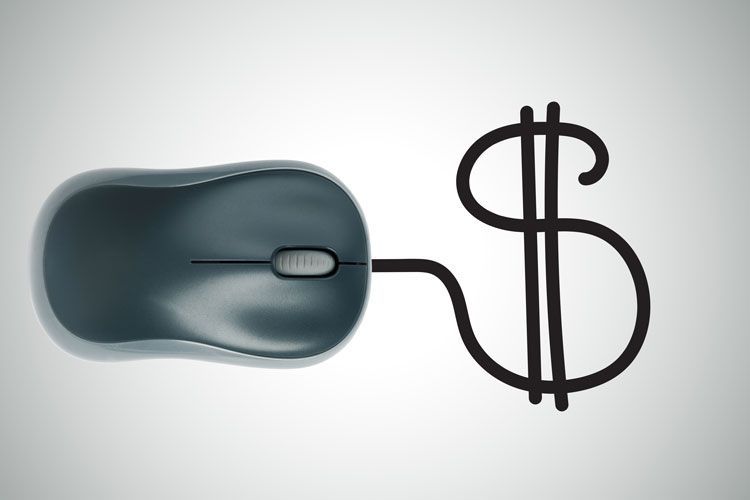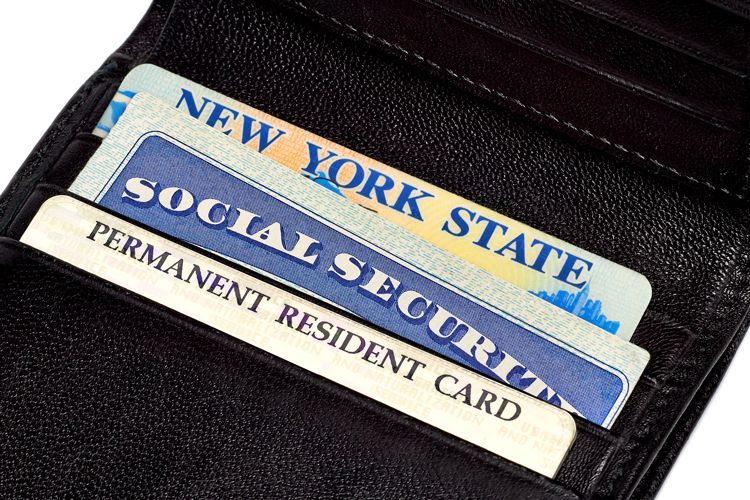Everything You Need To Get Organized During And After A Divorce
Divorce is always difficult and complicated, but there are ways to make the logistics a bit more manageable.

One of the most disruptive and emotional moments a person can experience is going through a divorce. Aside from the toll it takes on your mental well-being, it also involves volumes of paperwork.
Planning ahead and organizing the documents you’ll need to revise, the money you’ll need to spend, and the accounts you’ll need to manage can help make the divorce proceedings less stressful for everyone involved — yourself being the primary beneficiary.
Getting Legal: This information can help you wrap your head around all the things that need to be done, but let the attorneys do the heavy lifting (that's why you're paying them so much) to avoid making matters even worse (like having your ex get a restraining order against you).
Important Contacts

These are the people and organizations directly involved with the divorce proceedings, as well as others that might be able to provide assistance along the way.
- Your Attorney
- Your Ex-Spouse's Attorney
- Financial Advisor
- Insurance Agent
- Estate Attorney
- Other (Mediator, Therapist)
Update Emergency Contacts: Perhaps your ex is still a viable emergency contact… or perhaps your ex is the last person who should be contacted during an emergency. Either way, you should name new ones just in case.
Divorce Costs & Budget

The following should give you an idea of the money you’ll most likely have to spend while transitioning into life as a newly-single person.
- Legal Fees: This can vary greatly depending on your situation. If you work out all the details amicably and opt for free mediation, it can just be the cost of filing the paperwork with the court (around $300). If it’s a battle that drags on for years it’s obviously much more expensive than $300.
- Alimony & Child Support: Payment schedule and duration will depend on the final settlement.
- Car: You may need to buy or lease a car if you shared one with your ex; if you get the car in the divorce you’re now responsible for the payments. (We’ll get into insurance later.)
- Rent/Mortgage For A New Home: Don’t forget any security deposits, finders fees, or other costs that can quickly add up.
- Moving Expenses: Factor in any trucks, vans, or services required to move your things, as well as the basic utilities to get up and running (gas/electric, internet)
- Furniture or Appliances: You’ll need to replace all the important stuff your ex gets to keep (example: refrigerator, washing machine, kitchen table).
Don’t Forget: You might be able to write off some of your divorce settlement fees come tax time, as well as any alimony or child support payments. Ask your attorney or mediator to provide you with an itemized list of services performed and attach it to your tax documents. Then, bring it all to your CPA to prepare a Schedule A, or list it out where applicable if you do your own taxes, and report those costs to the IRS.
Update Beneficiaries

These accounts should be updated so your ex-spouse is no longer the beneficiary or transfer-on-death designation — unless your settlement states that they must remain a beneficiary for a period of time following the divorce:
- Personal Checking/Savings Accounts
- Investments
- Stocks/Bonds
- Mutual Funds
- 401(k)
- IRA
- Pension (SEP / SARSEP)
- Military Benefits
- 403(b)
- Roth IRA
- Trusts
Tip: Since you’re legally required to identify all your assets during a divorce, it makes sense to deal with the beneficiary designations now rather than later or never.
Bank Accounts & Credit Cards

If you and your ex maintained a degree of financial independence during your marriage then this is a lot easier to manage. If all of your assets were tied together, it can be a bit more involved.
Be Honest No Matter How Much It Hurts (and it might hurt): Be extremely open and transparent about your assets, not only for legal reasons but moral ones as well. Hiding or lying about assets can lead to penalties and create a toxic atmosphere of bad faith.
Open Your Own Bank Account: You need to open an account in your own name if you haven’t already.
Close Joint Bank Account: Unless you’ve worked out the details with your ex, wait until the divorce settlement is finalized to transfer funds from joint accounts into individual accounts. All assets need to be accounted for to avoid penalties and drawing the proceedings out longer than necessary.
Get Your Own Credit Cards: This isn’t much of an issue if you already have your own credit cards. If you relied on your ex-spouse's credit for the duration of your marriage then a financial advisor, attorney, or the bank in which you open an account should be more than willing to help you in this situation.
Close Joint Credit Cards
If you were the primary card holder: You’re on the hook for any outstanding debts, which must be settled before a card can be canceled.
If you’re the secondary cardholder: Don’t run up any debts out of spite or it could come back to haunt you in court.
If you’re worried your ex will run up debts but aren’t able to cancel the cards as fast as you like, make sure to regularly monitor the charges to make sure there aren’t any wild expenditures. If this happens make sure to tell your attorney or mediator so this can be factored into the settlement.
Autopay Alert: Before you cancel any cards make sure any accounts set on autopay are transferred to new cards to prevent any an interruption in service. (This is covered more comprehensively in the “Managing Shared Accounts” section.)
Reward Points & Frequent Flyer Miles
Points and miles aren’t typically transferable and stay with the primary cardholder, but first check the terms and conditions of that specific card. One way to fairly account for these in a divorce settlement is to assign a dollar amount to the points or miles, split them in half, and factor the amount into the settlement. (Examples: 1,000 points = $10; 1 mile = 1.2 cents)
Managing Shared Insurance Policies
Time to untangle and reassemble all the insurance policies you shared with your ex. This can get complicated so don’t be afraid to ask for help from your attorney or insurance agent.
Car Insurance

You can leave your current car insurance policy in place while you’re in the process of getting a divorce. Once the divorce is finalized you must contact your insurance provider within 30 days to let them know the following:
Who will be keeping the insurance and who will be removed?
This requires consent from both of you, which can be difficult if one of you is uncooperative (that person often ends up keeping the policy). It’s also normal for the person who gets the home to keep the policy if it’s bundled together with property insurance. (Your attorney or insurance agent can give you more information on this.)
Purchase a new policy before being removed
Shop around for a good rate and secure a policy since you need to have insurance before removing yourself and vehicle from an existing policy.
Remove yourself or your spouse from the car title
The name of the insured should be on the car title. Often, a couple will amicably agree who gets which vehicle and not deal with the paperwork. It becomes increasingly problematic over time if someone ends up with a vehicle in the name of the other person. Your provider can help you sort this out.
Transfer premium payments to the person keeping the insurance
If insurance payments are set on autopay and tied to a joint credit or banking account, make sure it’s transferred to the existing policy holder. You shouldn’t be paying for insurance that isn’t yours; you also don’t want a policy to lapse because the premiums haven’t been paid.
Warning: There can be legal and financial consequences for not having separate insurance so don’t put this off.
Health Insurance

One you’re legally divorced an ex-spouse can no longer be named as a dependent, which can make it much more difficult for the person losing coverage. The only way to change your health insurance outside of the annual enrollment period is when you experience a “Qualifying Life Event.” Divorce is one of them.
The Primary Insurance Holder
- Notify your benefit manager of your divorce; If you use a digital platform to access benefits, find the “Qualifying Life Event” section to change your coverage
- Remove your spouse as a dependent
- Abide by your divorce settlement regarding other dependents (underage children, special needs adults)
Options For The Dependent(s)
If you’re currently employed: Sign up for coverage through your employer (“Qualifying Life Event”)
If you’re currently unemployed:
- Purchase a policy directly from an insurance company or your state’s health insurance marketplace.
- Maintain coverage through your ex-spouse's insurance via COBRA, which allows family members who lose group insurance to buy coverage for up to 36 months. To facilitate this option you’ll need to speak with your ex-spouse’s benefits manager.
Health Costs: The person losing coverage should factor health insurance into a settlement since both of these options can be very expensive. Speak with your attorney to figure out the best plan of action. If neither of these options are financially viable, you might want to find out if you’re eligible for Medicaid.
Life Insurance

Get in touch with your insurance agent or company to discuss the following options:
- Those With: While you may want to remove your ex-spouse as a beneficiary on a current Life Insurance policy as soon as possible, you may need to leave it in place to account for child support or alimony payments if something happens to you.
- Those Without: If you don’t have Life Insurance, you may have to purchase a policy as part of a settlement to account for child support or alimony payments.
- Those In The Clear: If you have a policy and no legal obligation to pay anything as part of the divorce agreement, then you can remove your ex as a beneficiary when the divorce is finalized. Now you have the option to name new beneficiaries (children, family, charity, etc…)
Homeowners/Property Insurance

Like car insurance, you’ll want to keep this in place until the divorce is final, but you should still contact your insurance provider to make sure everything is done properly. If it’s bundled with any other insurance (vehicle, life) then you can do it in one fell swoop.
- Contact your property insurance company during the separation and let them know divorce proceedings are underway.
- It’s customary for the policy to be in the name of the homeowner; the name of the other person should be removed.
- Make sure the premium payments are associated with the current homeowner and not the person who moved out.
- If you moved out get property insurance for your new place — perhaps you can get a deal if you bundle it with car insurance.
While we’re on the topic of homes, let’s dive into everything that goes into running a home and what you’ll need to know or share.
Household Details: Payment & Utilities

The person remaining in the home should have all the utilities in their name and know how each one is paid for or what the rates should be. This includes:
- Ownership Details
- Location of Deed or Lease
- Payment Information (Mortgage/Lease)
- Property Tax Information
- Utilities:
- Electric/Gas
- Water
- Internet/Cable/Phone
- Health Oil/Propane
- Vendors & Services:
- HVAC
- Septic
- Garbage Removal
- Cleaning
- Landscaping
- Exterminator
- Plumber
- Electrician
- Pool Care
- Handyman
- Security
- Security Company Name
- Change the code words and passwords
- Change the passwords for any security video cameras (Ring, Nest Cam)
- Smart Home Devices: Include instructions for use (example: Nest, Google Home).
If you’re the one keeping home, it’s your responsibility to take care of all of these things now. Think of this as a way to avoid calling your ex when something goes wrong. If you’re the one moving out, think of it as a way of saying goodbye to that place forever.
Revise Important Legal Documents

Your ex-spouse’s name undoubtedly appears on crucial legal documents so make sure to update the following:
- Advanced Directive (Living Will & Health Care Proxy)
- Last Will and Testament
- Property Ownership Documents
- Power Of Attorney
- Trusts
An Example Of Why This Really Matters
Let’s say you don’t update your Will, get remarried, and start another family. Then you get hit by a bus. When they find your Will it makes no mention of your current family and says your first spouse gets everything. Do you think your first spouse will forfeit your estate to your current family? Do you even want to take that chance? No? Then update your Will.
For Those Who Haven’t Done Any Planning Yet
If you haven’t already created these documents, now’s a great time to do it — especially if you have underage children and haven’t named a guardian. Speak with your attorney to start your new life on a positive planning note.
Managing Passwords & Shared Accounts

Control access to your digital world by resetting the passwords on these devices, services, and accounts.
Cell Phone
If you have a bundled family plan that’s still under contract this can become your biggest nightmare. It gives us cold sweats just thinking about this. You might just want to stay married after all.
Ok, if that’s not an option contact your provider and figure out the best plan of attack. Regardless of the hassle, it’s best to have separate phones from here on out.
Mobile Tip: Change password and unlock codes on your phone, computer, and tablet to prevent snooping. (Divorces can get ugly so why take the chance?)
Password Manager
If you use one of these nifty, life-altering services to share passwords with your ex, you need to change the master password. From there you can go through all your accounts and remove permissions and change passwords to secure your accounts. Also, make sure to update your Emergency Access Contact, or add one if you haven't already.
For those keeping track of their digital world the old fashioned way — like in a Word document or on a piece of paper — here’s an overview of the types of accounts and services to focus on to get you on the right path:
- Email (Gmail, Yahoo, Outlook)
- Social Media (Facebook, Instagram, Twitter, Linkedin, Tumblr...)
- Shopping Accounts (Amazon, eBay, Walmart, Target)
- Entertainment Streaming Accounts:
- Movie/TV (Netflix, Hulu, Amazon Prime, HBOgo)
- Music: iTunes/Apple Music, Spotify)
- Gaming (Xbox Live, PlayStation)
- Cloud Storage: Primarily for photos (Dropbox, iCloud, GoogleDrive, OneDrive)
- Software (Microsoft Office, Adobe Creative Suite, Final Cut Pro, Turbo Tax)
- Web Hosting (GoDaddy, Bluehost, Network Solutions)
- Messaging/Communication tools (Skype, FaceTime)
- Travel/Ticketing (Booking sites, Airlines, Hotels, Uber, Car Rental)
- Delivery Services (UberEats, Seameless, Grubhub, Amazon Now)
You may have kept some of these accounts completely independent during your marriage and don’t need to change much. But if you’re the least bit concerned your ex might compromise an account for any reason — even by accident, like if you left a computer behind that’s still logged into your Facebook account — treat everything like you’ve been hacked and change your passwords.
Payment & Money Management Services

Tread lightly around these accounts during your divorce proceedings to avoid any problems down the road.
Payment Only
If it’s a payment service like PayPal, Venmo, or ApplePay, which contains no actual funds and has no ties to your ex, it’s generally not considered an asset so you just need to change the passwords and make sure the payment method is still active (checking account, credit/debit card, etc…).
Accounts Containing Financial Assets
If it’s an investment site that contains assets from a financial institution (Fidelity, UBS, Ameritrade, Chase, etc…), online financial service (Etrade, Betterment, Learnvest), or a business venture that generates revenue (eBay, Amazon store, Square) then it needs to be disclosed as part of your divorce.
When In Doubt, Speak With A Pro
Be careful when dealing with any financial or sentimental assets that could be in dispute. You might think something is no big deal, but emotions can run rampant on both sides. If you’re unsure of anything, always consult your attorney or financial advisor.
Name Change

If you took your ex-spouse’s name and want your old one back here are the forms of ID you need to update:
- Driver’s License
- Social Security Card
- Passport
- State ID
- Armed Forces ID
- Work ID
You’ll also want to change your name on social media, email signatures, and anything else that’s visible to the world.
Get Your New IDs Before You Ditch The Old Ones
If you plan on traveling, entering secured buildings, or doing any official business you need to have an ID that corresponds with the name on the ticket or security list. If you don't, you’re in for a hassle. Even though it may pain you to keep your ex’s name, you need to wait until everything is official.
Co-Parenting & Joint Custody

Where do you even begin with this one? Start with the basics as laid out in your settlement agreement — or the agreement you’re working towards if you haven’t reached one already:
- Details of Custody Agreement
- Visitation Schedule
- Payment Arrangements
If the communication between you and your ex isn’t ideal, which is understandable, keep general notes to share with your ex regarding the kids. Here are some high level topics:
Health & Medical
- Contacts for all doctors (general practitioner, specialists, therapist)
- Medications
- Most recent immunization records from last check-up (needed to go to school, camp, or other major activities)
- Food Allergies as well as likes/dislikes
- Noticeable changes in attitude, mood, or behavior
Update Your Contact Info For Schools & Doctors
Make sure your kids’ daycare or school has your and your ex’s updated contact information. While you’re at it, pass that info along to their doctor, too.
Daily/Monthly Schedule
For each of the following make sure you have updated contacts for each school, organization, and a contact list of parents of kids who are best friends or involved in any of the activities listed here:
- School
- Camp
- Tutors
- Lessons (music, dance, karate)
- Activities (sports, crafts, playdates)
- Holidays/Vacations (including who gets kids for which vacation/holiday as well as any scheduled major trips coming up)
Financial Paperwork
Your attorney or financial advisor needs know the following to avoid an IRS-induced headache later:
- Head of Household Status on Tax Return
- Ownership of 529 College Savings Plans
Granted, this is easier said than done, but figuring out a way to communicate productively and peacefully will benefit your kids in the long run.
Assets & Personal Mementos

Apart from the big items that should be accounted for in a divorce settlement (house, cars, expensive things), there’s lots of other stuff that needs to be divided. Some of it might be obvious (clothes), some might present a gray area (electronics, appliances), and some might be difficult to even comprehend at this point (photo albums, grandma’s wedding ring).
Try and categorize all the things into three sections:
- Stuff I Really Care About
- Stuff I Don’t Care About
- Stuff I’m Ambivalent About
Not very sophisticated but it gives you some direction during a difficult sort. Perhaps you and your ex can find common ground and make quick work of it. Or maybe you’ll end up fighting over every item and require your attorneys or a mediator to assist.
Sentimental Sorting: It’s par for the course to get emotional while finding old anniversary cards or vacation photos from happier times. You might have the urge to purge everything that reminds you of your marriage, but you should take your time and be thoughtful. You don’t want to regret throwing away any of the things you or your kids may one day appreciate when the emotions subside.
If this is too difficult for you to handle on your own, reach out to a professional organizer or therapist to help get through the tougher moments. You may feel alone during what might be the most difficult thing you’ll ever face in your life, but there are people who have been through this and can help. You just have to ask.
Downloadable Divorce Worksheet


This worksheet can help you or someone you know get things in order before, during, or after a divorce.
Help Us Out

Did we leave anything off that would be helpful for someone going through a divorce? It could even be a personal lesson you learned that you'd like to share with others. Don’t keep it to yourself! Share it with us here.
- All The Information You Need To Share About...It’s incredibly sad to think of our pets without us, but here’s your chance...Read more
- Estate Planning For Your PetsAmerica is approaching a belly rub crisis. Or, in the case of cats, that...Read more
- What To Say To Someone Grieving The Loss Of A PetFor most people, it’s not just a dog, cat, or other domesticated animal....Read more
- Planuary: Organizing For The New YearIf the turn of a new year inspires you to finally get your life in order, we...Read more



